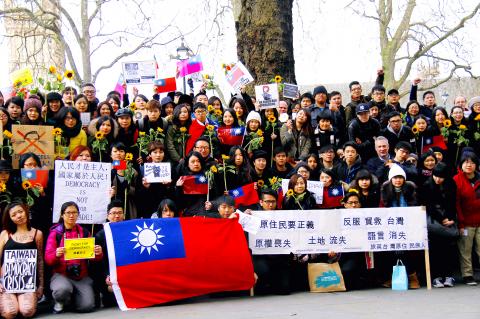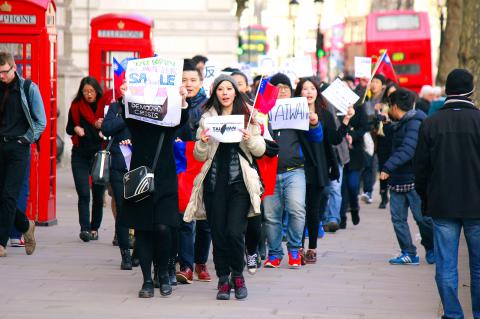Taiwanese students and expatriates gathered in central London on Sunday afternoon to show their support for the occupation of the Legislative Yuan and democracy back home.
More than 200 people marched from London’s Piccadilly Circus to the Houses of Parliament, passing the British prime minister’s official residence at 10 Downing Street on the way. Many carried Republic of China (ROC) flags, while others displayed sunflowers or placards criticizing the cross-strait service trade pact.
Meanwhile, in the US, about 100 Taiwanese-Americans gathered on the National Mall in Washington over the weekend, waving placards and chanting in support of the student action in Taipei.

Photo: Courtesy of Chen Szu-wei
In front of London’s iconic Big Ben and the Houses of Parliament at Parliament Square, speakers voiced their support for the “Sunflower Revolution” and the crowd sang Do You Hear the People Sing? from the musical Les Miserables, an unofficial anthem of various recent protests in Taiwan.
Events at the Legislative Yuan galvanized Chen Szu-wei (陳思維) to use social media to organize Sunday’s march in London.
“Due to the Taiwanese government’s stubborn attitude on the cross-strait agreement with China, which is a far-reaching agreement that has not been carefully reviewed and has not been subject to transparent review, we decided to rally together and stand up to fight against the decision of the Taiwanese government and protect the democracy of our country,” he said.

Photo: Courtesy of Chen Szu-wei
Chen, 30, works in London and was keen to show solidarity with protesters.
“We can’t fly back to support them, but we can show our determination to preserve democracy,” the Greater Taichung native said.
Ukrainian tourist Viktor Kripak saw the protest and felt obliged to address the crowd in light of recent events in his homeland.
“I think it’s very important to show people in London that in Taiwan there is such a situation,” Kripak said.
A 27-year-old from Hong Kong — who gave only the name Chas — was also sympathetic.
“Recently the government in China has been curtailing freedom of speech [in Hong Kong], so that’s why I can understand how bad [the Taiwanese protesters] feel. I guess it’s good to come out and give support to them,” Chas said.
A Chinese student also declared his encouragement, expressing his wish that one day young people in China would have their voices heard.
Anna Peng from Taipei, who is studying for a master’s degree in psychology in London, also addressed the crowd.
“I felt the need to come out to kind of stand up for my country and express my opinions to the [ROC] government that we are not comfortable with the way the government is dealing with China at the moment,” she said.
Long-time London resident Liu Yu-chuan (劉鈺娟) said that Taiwanese of all political persuasions should be concerned about the way the service trade agreement has been handled.
“It’s a simple request for transparency,” she said. “The service agreement impacts on immigration and Taiwan’s tax, health and benefit systems, and hence deserves a public hearing and thorough scrutiny.”
Londoner George Mills, who is married to a Taiwanese, was worried about the potential effects of the cross-strait pact and wanted to attend Sunday’s event to give his backing to the struggle for freedom.
“A lot of people in Taiwan know what it’s like to live in a dictatorship, and it’s a young democracy that they have, and I’m here to support that,” Mills said.
Additional reporting by William Lowther

SECURITY: As China is ‘reshaping’ Hong Kong’s population, Taiwan must raise the eligibility threshold for applications from Hong Kongers, Chiu Chui-cheng said When Hong Kong and Macau citizens apply for residency in Taiwan, it would be under a new category that includes a “national security observation period,” Mainland Affairs Council (MAC) Minister Chiu Chui-cheng (邱垂正) said yesterday. President William Lai (賴清德) on March 13 announced 17 strategies to counter China’s aggression toward Taiwan, including incorporating national security considerations into the review process for residency applications from Hong Kong and Macau citizens. The situation in Hong Kong is constantly changing, Chiu said to media yesterday on the sidelines of the Taipei Technology Run hosted by the Taipei Neihu Technology Park Development Association. With

CARROT AND STICK: While unrelenting in its military threats, China attracted nearly 40,000 Taiwanese to over 400 business events last year Nearly 40,000 Taiwanese last year joined industry events in China, such as conferences and trade fairs, supported by the Chinese government, a study showed yesterday, as Beijing ramps up a charm offensive toward Taipei alongside military pressure. China has long taken a carrot-and-stick approach to Taiwan, threatening it with the prospect of military action while reaching out to those it believes are amenable to Beijing’s point of view. Taiwanese security officials are wary of what they see as Beijing’s influence campaigns to sway public opinion after Taipei and Beijing gradually resumed travel links halted by the COVID-19 pandemic, but the scale of

A US Marine Corps regiment equipped with Naval Strike Missiles (NSM) is set to participate in the upcoming Balikatan 25 exercise in the Luzon Strait, marking the system’s first-ever deployment in the Philippines. US and Philippine officials have separately confirmed that the Navy Marine Expeditionary Ship Interdiction System (NMESIS) — the mobile launch platform for the Naval Strike Missile — would take part in the joint exercise. The missiles are being deployed to “a strategic first island chain chokepoint” in the waters between Taiwan proper and the Philippines, US-based Naval News reported. “The Luzon Strait and Bashi Channel represent a critical access

Pope Francis is be laid to rest on Saturday after lying in state for three days in St Peter’s Basilica, where the faithful are expected to flock to pay their respects to history’s first Latin American pontiff. The cardinals met yesterday in the Vatican’s synod hall to chart the next steps before a conclave begins to choose Francis’ successor, as condolences poured in from around the world. According to current norms, the conclave must begin between May 5 and 10. The cardinals set the funeral for Saturday at 10am in St Peter’s Square, to be celebrated by the dean of the College